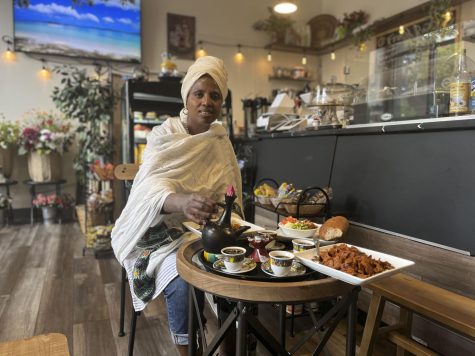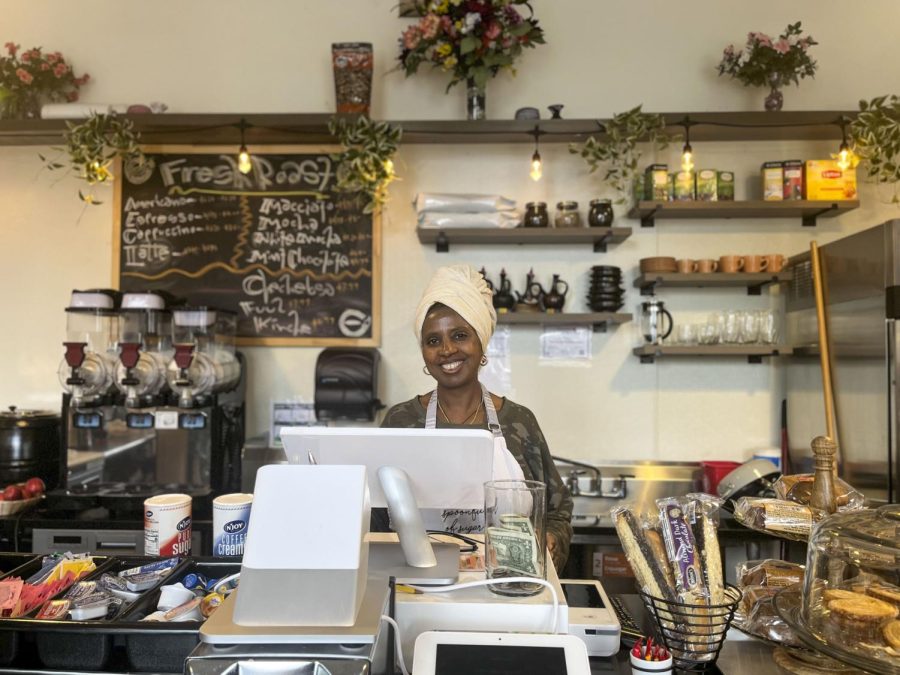After 14 years of hard work, Yejotework “Jote” Mulat opened Café Jote, an Ethiopian coffee shop, in August. Since then, the new West Bank coffee shop has found its footing as a student favorite and an authentic Ethiopian experience.
Mulat, 43, lived in Ethiopia for most of her life but now lives in Cedar-Riverside after moving there in 2008.
During her first 14 years in Minneapolis, Mulat said she worked full-time as a room attendant at the Hilton Hotel. Including her part-time gigs at Dilla’s, the Red Sea and Ras Ethiopian Restaurant, Mulat said she averaged about 70 hours of work per week.
Mulat said she always knew she wanted to open an Ethiopian café in this community.
“I was always dreaming and always saving,” Mulat said.
Mulat studied the area and saw a need in the community for another place to eat breakfast, and she wanted to fill that need, according to her husband Abreham Tola.
“After 11 a.m. there are many regular restaurants open here, but early in the morning for breakfast, it’s only Hard Times Cafe,” Tola said.
Lydia Hester, a third-year student studying political science and global studies, said she was glad to see a new coffee shop on West Bank.
“It’s really nice to have another coffee option because there are less on West Bank,” Hester said. “It’s just across the street from Hubert Humphrey, so I walk by it almost every day.”
Hester said she recommends this place to students in the area because of its location and environment.
“It was such a great place to study,” Hester said. “I definitely recommend the café to anyone who has a lot of classes on West Bank because it’s so close and it’s definitely a good option for coffee or anything else.”
The menu Mulat created offers Ethiopian breakfast cuisine and a variety of classic coffee beverages like lattes and cappuccinos. The menu highlights three main Ethiopian dishes: chechebsa, kinche and fuul. These dishes include options for those on vegan and gluten free diets.
Beyond the food, Café Jote offers a glance into Ethiopian culture through the jebena coffee pot. This coffee ceremony, practiced often in Ethiopia, displays how central coffee is to Ethiopian social life.
Mulat said in Ethiopia, people would have coffee with different neighbors and friends multiple times throughout each day.

The jebena coffee order comes as strong black coffee in a special pot with small decorative cups for two people alongside some burning incense, similar to how coffee is served in Ethiopia. Customers who order jebena can expect a slower and more social experience than the typical coffee trip of a student on the go.
“I want everyone to come in, and I want people to love Ethiopian coffee and the culture,” Mulat said.
Itcel Solana, an Afro Deli employee who works next door, said she has been a frequent customer there since it opened and commends Mulat.
“I think she’s a really nice woman, and she especially gives a lot to the homeless and people in need. She is just the sweetest owner and barista,” Solana said.
Mulat said so far, the progress within her business has been good and the community has been encouraging.
“I want people to come and see beautiful things and to relax,” Mulat said. “I want people to leave feeling fresh and happy. That is what makes me happy.”













